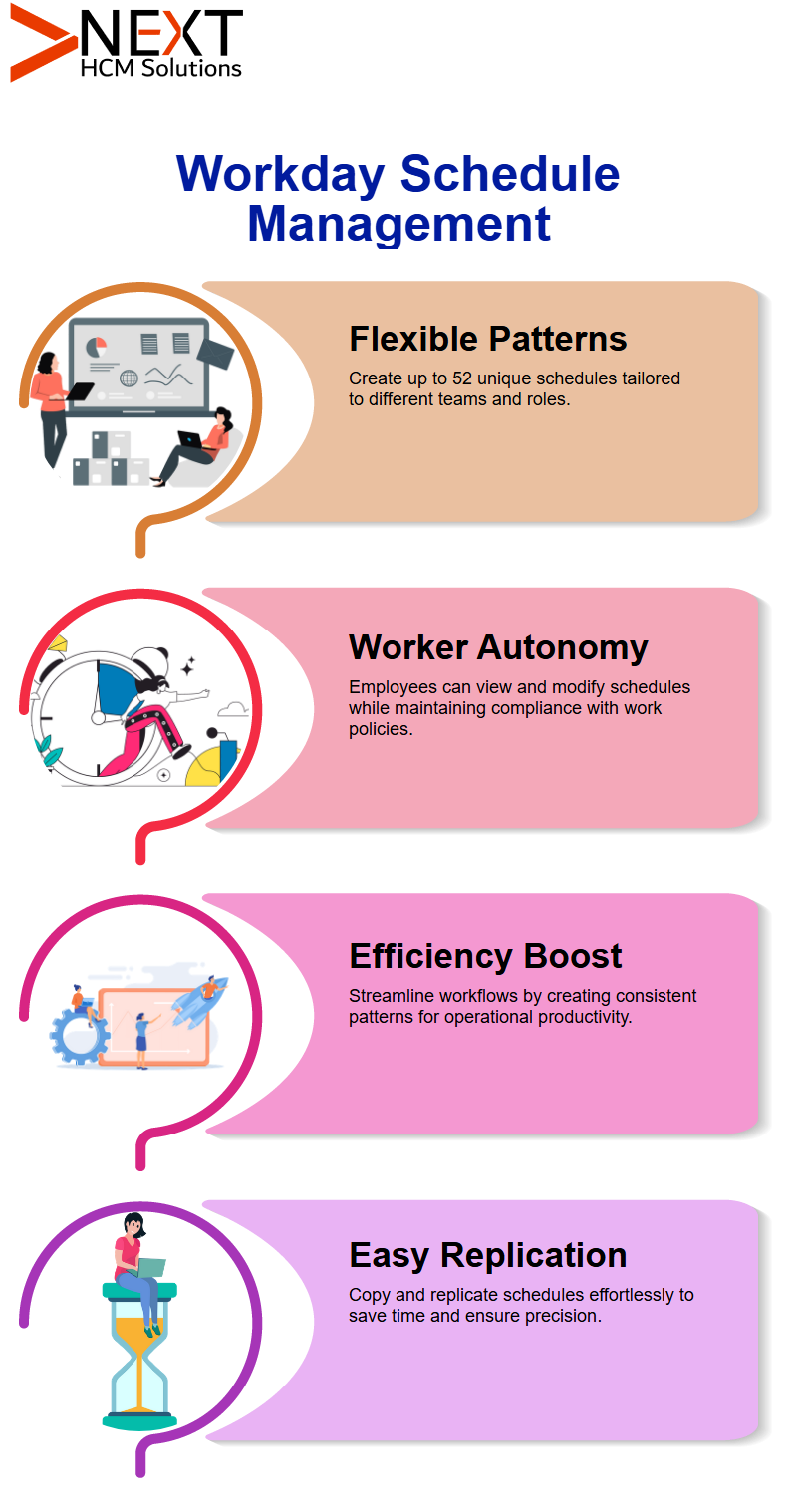Join the Best Workday Training in Bengaluru to Learn, Practice and Suceed
Workday Time Tracking Course in Bengaluru
Training Blueprint
Workday Time Tracking makes managing work schedules efficient by offering organizations an efficient tracking solution with guaranteed accuracy in work patterns.
Once your Workday Time Tracking calendar is in place, you can create specific schedules tailored specifically to the workforce. Step one is usually setting workdays; typically, Sunday is considered the first of seven working days each week.
Offering flexible time management capabilities, it allows your staff to get back to business faster! Workday Time Tracking Course in Bengaluru makes this transition even more beneficial for local businesses by enabling access to specialized guidance
Workday Time Tracking allows companies to customize the calculation periods based on their needs, with weekly transitions or custom schedules being easily accommodated for.
Configuring Work Patterns with Workday Time Tracking
Understanding work patterns is of great importance and with Workday Time Tracking you can define them for each employee in order to provide clarity for shifts and schedules.
To create patterns within Workday Time Tracking, navigate within and select the configuration option before specifying work and non-work days.
Customized time management solutions enable more varied patterns besides standard patterns like 9-6 shifts.
Example of Workday Time Tracking features. Your weekly work schedule might consist of Monday through Friday with various start times; by using Workday Time Tracking’s customizable settings to adjust them accordingly, Workday ensures your workforce adheres to a well-organized routine.
With Workday Time Tracking Course in Bengaluru gain hands-on experience with this kind of real-world configuration.
Workday Time Tracking and Scheduling Flexibility
With Workday Time Tracking’s multiple schedule configuration features and scheduling flexibility options, Workday Time Tracking makes time tracking not just possible but seamless as it adapts seamlessly with employee needs whether multiple shifts exist within an organization. This tool makes for effortless adjustments.
Workday Time Tracking helps organizations to effectively coordinate employee schedules that may differ across geographies.
You can even configure work calendars according to regional needs, a topic often explored in detail in the Workday Time Tracking Course in Bengaluru.
Workday Time Tracking allows businesses to ensure smooth scheduling while reducing errors and increasing workforce efficiency.
With its versatile nature and built-in tracking features, Workday Time Tracking should become part of every company’s time tracking arsenal.
Creating Patterns in Workday Time Tracking
Once logged into Workday Time Tracking, patterns that you can customize will appear. First select the date range in which this pattern should take effect (for instance weekly schedule starting on certain date) then start designing it!
To set a weekly schedule using Workday Time Tracking simply set off from one specific day by choosing from among many dates available in Workday.
Click the plus sign to create a new pattern and configure working dates and times for each day, such as 9 am to 7 pm work on Monday for example, using start/end times as appropriate for that day and so forth for every other weekday of that particular pattern.
Many tasks demonstrated in the Workday Time Tracking Course in Bengaluru cover this process thoroughly.
Adjusting Patterns for Employee Needs
Adjust Patterns to Suit Employee Needs Workday Time Tracking allows you to assign different patterns for different employee groups.
For instance, one team might follow a typical 9-to-6 schedule while another might require special shift patterns like 2pm-7pm shifts. You can easily tailor these patterns according to each employee group’s individual requirements.
Create multiple patterns within the same system so each employee’s schedule reflects his or her workload and responsibilities.
This flexibility ensures a more satisfactory workday experience for everyone involved. For those pursuing the Workday Time Tracking Course in Bengaluru, mastering this adaptability is a key learning outcome.
Workday Time Tracking for Real-Time Adjustments
If an employee’s schedule shifts unexpectedly, you can edit his/her pattern quickly to accommodate new timings; regardless of shift work or regular employees. Workday’s system adapts seamlessly.
Techniques such as these are explained in the Workday Time Tracking Course in Bengaluru, which focuses on efficient pattern replication.
There’s even an EAB feature which helps clone and manage patterns for larger groups, making Workday Time Tracking much simpler when dealing with complex workforces.

Exploring Workday Time Tracking Patterns
Workday time tracking patterns can vary as widely as your workforce itself – from traditional 9-6 schedules to shift work arrangements – the possibilities are virtually limitless.
Experiment with different patterns until you discover which works best for your organization. Even when managing multiple teams with conflicting schedules, Workday Time Tracking helps streamline this process so you can concentrate on more strategic tasks.
In the Workday Time Tracking Course in Bengaluru, learners simulate these diverse scenarios for hands-on skill building.
Workday Time Tracking Patterns
Imagine that a worker requires flexibility. Workday Time Tracking allows workers to set and modify their schedules independently.
Daily restrictions such as setting minimum working hours per day can be set; this ensures compliance with company policies while meeting individual needs.
Role of Work Schedules in Tracking Time Day Activity
Have you ever found yourself wondering how companies keep track of work schedules?
Workday Time Tracking offers an outstanding solution once a work schedule is configured it serves as the foundation of successful management of working hours.
It ensures all parties remain aligned by assigning start and end times for everyone involved in tracking time. From manufacturing environments with fixed daily schedules to office setups with flexible timing requirements, the system adapts seamlessly.
Customizing Worker Patterns with Workday Time Tracking
With Workday Time Tracking, personalizing worker patterns is effortless. Once inside the system, you can effortlessly craft unique schedules to reflect specific job roles.
Set start dates, working hours and even eligibility requirements for specific tasks.
Workday Time Tracking allows teams in Canada to set a work schedule based on local holidays and company policies ultimately creating an ideal system that suits everyone involved.
Effective Time Tracking with Workday Time Tracking
Time tracking through Workday Time Tracking goes beyond mere schedules: its focus lies in efficiency.
Through features like daily restrictions and pattern customization, Workday Time Tracking ensures workers log the right number of hours while maintaining work/life balance.
Think of Workday Time Tracking as a tool that makes time management simpler for all, whether an employee or manager.
Workday Time Tracking makes the process seamless while guaranteeing smooth operations.
Example of Workday Time Tracking Patterns
Your employees can set patterns like working Monday from 9 AM to 5 PM, Tuesday 10 AM to 5 PM, Wednesday at 11 AM starting later and so forth. Our flexibility ensures everyone remains organized and productive during each Workday Time Tracking cycle.
As you explore the scheduling page, it becomes apparent how Workday Time Tracking effectively captures patterns effortlessly.
This approach helps you manage different schedules easily; such as one pattern for one week and another pattern the following one, making calendar management much simpler for teams and their members.
Step one in developing and applying an effective schedule involves designing and applying an ideal pattern. For instance, this could range from 9 AM to 6 PM daily or be altered according to real-time demands.
Workday Time Tracking makes it possible to adapt patterns based on actual working hours, creating amazing tracking solutions that adapt perfectly with different shifts. It truly shows just how versatile tracking can be!
Time Management with Workday Time Tracking and its Customization
Workday Time Tracking may present unique situations which require different time schedules to meet deadlines and manage work-flow effectively.
Production workers typically need to meet minimum hour requirements of five per day or weekly targets such as 30. Workday Time Tracking easily meets these specific needs of production employees.
Workday Time Tracking allows you to set restrictions that govern minimum or maximum log hours in the system, providing your team with a tailored tracking experience while remaining flexible.
By activating such features, the tracking experience can be customized specifically to their needs while remaining adaptable and flexible.
Workday Time Tracking goes beyond simply recording hours; it allows users to develop patterns that work.
There are options to customize daily operations by building or editing schedules to best match business activities everything from creating uniform work hours for all staff, breaks and buffers and the possibility for customization is virtually limitless!
Workday Time Tracking allows your team the freedom to customize their schedule while adhering to company policies.
These changes introduce order into a hectic daily work rhythm. Production environments benefit greatly from Workday Time Tracking with its precise time tracking that enforces minimum and maximum hours for increased efficiency.

Productivity and Efficiency with Workday Time Tracking
One feature especially impressive with Workday Time Tracking is its capability of setting buffers of 15 or 20 minutes as needed to accommodate workers operating under tight schedules, thus maintaining productivity even with limited hours available for tracking time.
Through Workday Time Tracking’s Time Management features, productivity can remain steady even when overall productivity levels decrease drastically.
Keeping time records with Workday Time Tracking helps maintain high productivity during tight schedules making it ideal for effective time management.
Experts often highlight this advantage in the Workday Time Tracking Course in Bengaluru, emphasizing that mastering buffer times is vital for compliance and efficiency.
Workday Time Tracking simplifies managing time by enabling employees to easily monitor schedules, ensuring accurate timekeeping and enhanced efficiency.
Furthermore, its user-friendly design allows precise time entries with flexible start and end times as well as buffer adjustments, ensuring accurate timekeeping and efficiency for employees.
Employees can easily set their work patterns, defining working days, hours, and break periods with ease. An intuitive interface enables seamless editing of schedules to promote efficient planning.
Automated scheduling greatly reduces manual effort while streamlining tracking processes, providing seamless time tracking. Automated calendar creation tailored specifically for company requirements offers valuable insights, enabling employees to adhere to predefined schedules and maintain structured workflows seamlessly with Workday Time Tracking software.
Workday Time Tracking makes time management straightforward by enabling employees to monitor schedules easily and ensure accurate timekeeping and efficiency.
Schedule creation is simplified by providing precise time entries, flexible start and end times, buffer adjustments, and employee configuration of patterns that define working days, hours, and break periods effortlessly.
Smart Scheduling using Workday Time Tracking and Time Management
Automated scheduling greatly minimizes manual effort while streamlining tracking processes, providing seamless tracking.
Automated calendar creation tailored specifically for company requirements provides valuable insights that enable employees to abide by predefined schedules and maintain structured workflows seamlessly with Workday Time Tracking software.
Workday Time Tracking makes time management simple by enabling employees to easily monitor schedules and ensure accurate timekeeping and efficiency.
Schedule creation can be simplified using this software by providing precise time entries, flexible start and end times, buffer adjustments and employee configuration of patterns seamlessly defining working days, hours and break periods.
Automated scheduling software provides seamless editing capabilities to create effective plans, while its intuitive user interface facilitates effortless edits for seamless planning.
Taking a Workday Time Tracking Course in Bengaluru can help users fully understand these powerful scheduling features.
Manual work can now be reduced considerably for hassle-free tracking!! Work calendar creation that meets company requirements can be simplified through its use, providing employees with clear insight to assist with adhering to predefined schedules and maintaining structured workflows.

Establish and Adjust Patterns in Workday Time Tracking
Workday Time Tracking allows managers and employees to set work schedules that best meet employee and operational needs, creating patterns is about organizing schedules to fit them perfectly.
Shift workers require more flexible patterns. With Workday Time Tracking’s flexibility to create up to 52 unique time tracking patterns for different teams or roles, Workday Time Tracking makes this possible.
Enrolling in a Workday Time Tracking Course in Bengaluru is ideal for mastering the creation of these patterns.
Workday Time Tracking stands out among timekeeping software by its adaptability; patterns can be customized based on specific worker or group requirements within an organization – contractors, regular workers or specific divisions within. Thus, ensuring every element ties back into operational goals effectively.
Workday Time Tracking and Worker Flexibility
One of the hallmarks of Workday Time Tracking’s flexibility lies in worker access – specifically their ability to view or alter patterns within Workday.
Such autonomy may not be found in many organizations, yet can make an immense difference for employees who require personalized schedules. Furthermore, Workday Time Tracking supports restrictions that ensure minimum working hours are maintained.
Understanding these access controls is a focus area in the Workday Time Tracking Course in Bengaluru.
Imagine being able to log into your system and view your schedule clearly laid out, knowing exactly what’s expected and the workday time tracking patterns that enhance efficiency can make a seamless workflow possible for all involved. That would certainly improve productivity.
Enhancing Efficiency with Workday Time Tracking Patterns
Efficiency takes center stage when using Workday Time Tracking. By creating consistent patterns within an organization’s operations, Workday Time Tracking facilitates smooth operations that boost efficiency.
From manufacturing environments to corporate settings, being able to set clear schedules empowers workers and increases productivity.
Workday Time Tracking also incorporates tools for easily copying and replicating patterns with just a few clicks, saving time and resources while keeping precision. For those looking to become proficient with these tools, a Workday Time Tracking Course in Bengaluru is required.

Practical Aspects of Workday Time Tracking
You’ll quickly see that when using Workday Time Tracking, its focus on practical use becomes evident: workers see their schedules clearly, while any necessary updates can be implemented quickly and without hassle.
This system ensures employees adhere to their work hours while leaving room for adjustments as necessary.
Shift workers especially benefit from Workday Time Tracking’s flexibility to adapt to fluctuating work patterns this makes it perfect for environments such as manufacturing or production lines with constantly fluctuating schedules where Workday Time Tracking adapts seamlessly.
Workday Time Tracking Patterns
Are You Curious about Workday Time Tracking?
For anyone interested, here’s an introduction: It provides a streamlined method for monitoring schedules, patterns, and calendars across an organization giving powerful insights that are worth discovering! Its potential should not be ignored!
Start workday Time Tracking by first understanding work schedules. Imagine being part of a global team spread out over various locations – like Canada.
To do that effectively you must understand workday Time Tracking from its core concept – time tracking. A Workday Time Tracking Course in Bengaluru can Take you through this foundational knowledge.
Workday Time Tracking allows teams to tailor calendars and patterns specifically to their team’s requirements, giving everyone access to personalized attention from Workday Time Tracking.
Canadian work schedules often follow unique regulations which differ from other regions’ work schedules; our platform makes it simple and manage these schedules effectively.
Making a Workday Time Tracking calendar is easier than you think! Once inside the platform, navigate directly to the arrow icon in order to begin creating it.
Setting tracking periods simply involves marking the first day of each workweek – usually Sunday – as the starting point and creating calculation periods accordingly. As soon as familiar with this process, it quickly becomes second nature.
Setting Up Patterns in Workday Time Tracking
Clicking on the plus icon, selecting a date and outlining working hours couldn’t be simpler!!
For instance, an organization might use 9 AM-6 PM as their work pattern starting point and ending time each week if different working patterns apply; these adjustments can then also be made.
Workday Time Tracking’s flexibility enables teams to easily adapt the time tracking platform according to team needs and ensures seamless adaptation over time.
One of its many advantages lies in being able to capture detailed scheduling details. A Workday Time Tracking Course in Bengaluru dives into these scheduling specifics in detail.
Settling into patterns allows individuals to specify which days off they need and allocate specific hours per workday.
Workday Time Tracking helps create clarity between work days, keeping everyone informed.
Sunday could be designated an off day while Monday runs from 9 AM to 7 PM – workday Time Tracking helps capture this all so it remains visible to all involved parties.
Workday Time Tracking Can Handle Real-Life Scenarios
When it comes to real-life scenarios, Workday Time Tracking has you covered. Say you need multiple patterns under a single period schedule – Workday has you covered here too.
This platform was specifically created to address that. You can easily create multiple patterns based on your needs to ensure everything runs efficiently and without issue.
Organizations often prefer predictable patterns like the classic 9-to-6 schedule; with Workday Time Tracking you have more freedom and can create customized patterns tailored specifically for individual needs.
No matter if it be weekly transitions, unique start dates, or detailed calendar periods; our platform has you covered with tools for success.

